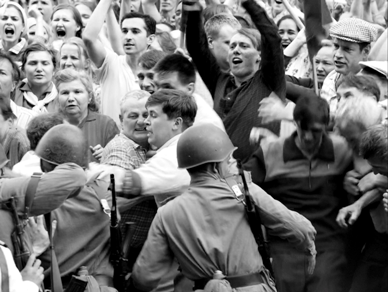 A veteran of Soviet cinema presents a powerful drama about an incident in 1962, when factory workers in a Don Region city go on strike, and a true believer in Stalinism must face the consequences of the corruption she has supported.
A veteran of Soviet cinema presents a powerful drama about an incident in 1962, when factory workers in a Don Region city go on strike, and a true believer in Stalinism must face the consequences of the corruption she has supported.
Andrei Konchalovsky is one of the last of the great “second generation” in Soviet cinema. He started in Russia in the 1970s, and eventually came to Hollywood. He’s always had a penchant for big blockbuster-type movies, action thrillers and epics. So it’s an unexpected twist that, at 83 years old, and now back in Russia, he’s made something unlike anything he’d done before—a careful, quiet, serious historical drama, a portrait in black-and-white of what an autocratic regime will do to the people who believe in and work for it. Based on a little known incident in 1962, it’s called Dear Comrades!
The Soviet government presented itself as a society by and for the working class. By definition, it wasn’t supposed to have labor troubles. If there were any, we on the outside would never hear about it. But in ‘62, in a city in southwest Russia called Novocherkassk, the combination of food prices suddenly skyrocketing while wages were being cut led to an actual strike by factory workers, a thing unheard of for forty years. The strikers shut down the plant and marched on Party headquarters in an organized demonstration. So, did Khrushchev’s government negotiate with the workers? No. Did it send in the Army and the KGB to violently suppress the revolt? Yes.
Konchalovsky could have told this true story from the workers’ point of view, as a form of remembrance or even a rallying cry, but the way he chose to tell it is a stroke of genius. We witness these tragic events from the point of view of the Party functionaries, the people in charge of upholding the establishment against the strikers. This narrative strategy reveals the tortured, dishonest mindset of those who obey the authorities without question.
Our main character is Lyuda Semina, spokesperson for the local committee of security for the city, and played by the excellent Yuliya Vysotskaya. Lyuda is the widow of an officer killed in World War II. She has a teenage daughter, rebellious and defiant; and her aged father also lives with her, a veteran of the early revolutionary period. In the opening scene we learn that she’s having a soulless affair with some party big shot. She must have been beautiful in the past, and you can still catch glimpses of that, but in her face and eyes today we can see a lifetime of care and worry. Lyuda thinks the country is sliding into ruin. She wishes Stalin were still alive—if he were still around, she believes, things wouldn’t be going so wrong. The strike disgusts her and makes her angry, and one of the fascinating aspects of this film is watching her and the committee trying to cope with a crisis they refuse to understand.
The strike ends in massacre, and Lyuda is caught in the middle—Konchalovsky’s depiction of the resulting chaos in the streets is gripping in its matter-of-fact sense of horror. And then Lyuda discovers that her daughter, who worked at the factory, is not at home like she thought she was, and is in fact missing. Was she one of the people who got shot? The mother goes from hospital to morgue, from one official to the next, eventually enlisting the help of a weirdly sympathetic KGB officer, and seeking relentlessly for any clue of what has happened to her daughter. Along the journey, the conflict in her heart between the faith and devoted service she has always given to the state, and the possibility that her only child might have been taken from her, drives her to the breaking point. Rarely has such pain and disillusionment been conveyed this boldly in a film.
Although Dear Comrades! is set in the Soviet Union, the picture astutely portrays the fear and conformity that rule in any authoritarian system. There are many subtle touches of behavior that show how years of suppressing one’s own judgment in favor of a rigid ideology can distort a person’s mind and emotions. The beautiful black and white photography is just right for evoking that era of the early ‘60s, and the film becomes more and more powerful with each scene, until its excruciating and cathartic finale. Dear Comrades! is a searing, soul-shaking masterpiece.

An increasingly synthetic world creates the conditions for new human organs of unknown purpose to appear in the body, in David Cronenberg’s latest dystopian...

This 1923 thrill comedy, climaxing in a famous climb up a skyscraper, shows silent comedian Harold Lloyd at his very best. There are three...

Victor Kossakovsky shows us the experience of farm animals without the mediation of human words and concepts, in a film that extends compassion to...